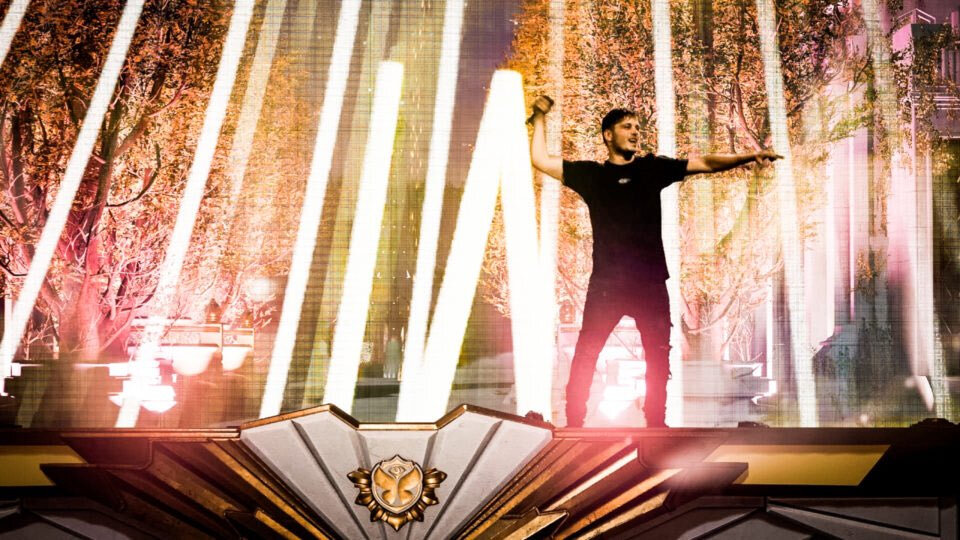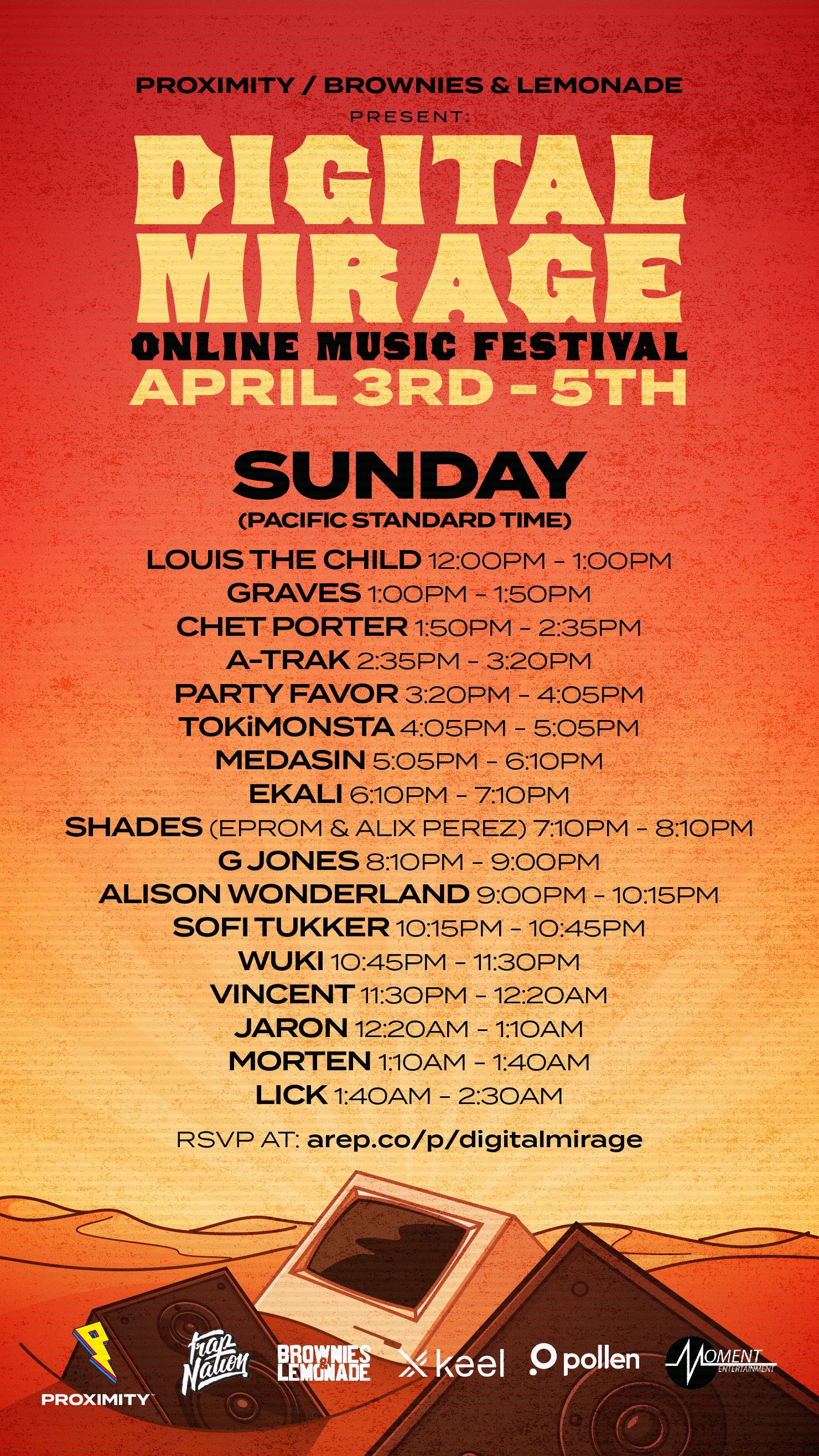Tomorrowland's Wildly Successful Virtual Experiment
/By Ryan Hayes
Last weekend Tomorrowland gambled big with dance music's first pay to attend virtual festival; Tomorrowland Around The World. While events like Room Service Festival previously featured over 100 artists for free, Tomorrowland showcased 60 high profile artists while attempting to create a truly immersive digital festival experience.
Website interface to get in between stages
In order to capture true to life movements Tomorrowland reportedly built four green screen studios around the world in: Boom Belgium, Los Angeles, Sao Paulo, and Sydney. Each production space featured 38 digital cameras which jointly amassed over 300 terabytes of raw footage. The 60 artists were spread out over 8 themed stages each built from the ground up and housed in the digital wonderland dubbed Pāpiliōnem.
Upon entering the festival grounds it was immediately apparent that Tomorrowland Around The World was in a league of its own. Different stages opened at different times, there were set time conflicts, cheesy drink recipes, motivational interviews, and a slew of the regular nonsense you find at real life festivals designed to fill your musical downtown. Pāpiliōnem itself was beautiful, especially after nightfall when the island burst to life with hundreds of glowing multicoloured lights.
Day 1:
Oliver Heldens held down the festivals opening slot with an hour and a half long Day Break Session. The attention to detail was impressive, and the events theatrics progressed seamlessly mirroring true to life sequencing. Being the first act the digital crowd was dispersed for Heldens; the sun was high in the sky, there were no fireworks, and the visuals were toned way down. Unfortunately, so much work was put in to the main stage itself that the audience looked uncanny and low resolution. To a degree it broke the immersion. Nonetheless as the day progressed and the sun went down the focus shifted to the stage and its light show refocusing the viewer on what mattered. Helden's performance was great, he is one of the few artists who has effectively utilized the pandemic to raise his stature within the EDM community, and he deserves every ounce of light shown on his talent.
Day one was ruled by the Freedom Stage and house music. David Guetta's Jack Back alias played an early morning set fulling legitimizing the artistic abilities of his side project. The set was easily a highlight of the day and proof that act should appear on more festival lineups. After Jack Back, Fedde Le Grand provided the only break from the Freedom Stage's programming. His set was at the Elixir Club; a secret stage housed within the Main Stage's compound. Fedde Le Grand doesn't play many North American festivals, so any set from the seasoned Dutch maestro is always welcome.
Tiesto AKA VER:WEST
After that is was back to the Freedom Stage for a world premier performance from Tiesto's newly minted progressive house alias VER:WEST. The set was moody, atmospheric, and polished—for fans expecting anything resembling his old trance days...it would have been a disappointment. The set was good enough to leave me curious to see where to Tiesto takes VER:WEST from here; and his late addition to the lineup was the kind of massive get an all digital festival like Tomorrowland needs to sell tickets.
It was during VER:WEST's set that the Freedom Stage's visuals truly popped. The dark enclosure downplayed the audience and focused on the laser/light show which was beautifully synced with the music. Tomorrowland's team really outdid itself, I was doubtful, but the visuals really brought the experience home.
Eric Prydz [CELL.]
After VER:WEST Eric Prydz closed out the Freedom Stage with his new [CELL.] concept. It was immaculate. Tomorrowland's visuals may have exceeded my expectations, but the [CELL.] was in a league of its own. Prydz team painstakingly created the kind of genuinely unique journey that his fans have come to expect—it needs to be fully experienced to truly be appreciated. The [CELL.] didn't disappoint and was undoubtedly as good as it gets until we can all return to real life events.
The only real time the main stage came to life on day one was during Afrojack and Armin van Buuren's sets. As soon as Afrojack hit the stage it became clear that an artists performance was just as important as the tracks they selected for their set. Filming a festival set in an empty studio is no easy task, but Afrojack brought the same energy he would to an Ultra set, and it really set him apart. During all of the sets at the Freedom Stage none of the artists uttered a single word, and while the music spoke for itself, it took the bombastic nature of the main stage and an artist like Afojack to fully complete the illusion of a live festival act.
Armin Van Buuren
Armin previously stated the importance of his Tomorrowland set in an interview leading up to the event. His hour was full of IDs fulfilling my hunch that Tomorrowland Around the World would replace Ultra as 2020's preeminent festival and the industries most importance testing ground. This was Armin's one quarantine live stream, and his chance to temporarily dominate a blog news cycle.
As much as I want to dislike Carnage...who was playing at the same time as Armin...he remains a highlight. It is impossible not to get swept up in the pure energetic madness that takes over when he graces the stage. It's delirium, it kills brain cells, and if you let it seep in to your bloodstream it provides a full body escape from reality.
CORE stage
By the end of day one it was clear just how much work was put in to the design of each individual stage. While Freedom provided the best lighting effects. Core brought Shambhala forest party vibes (Anna's set was a highlight), and The Cave conjured a otherworldly shipwrecked fantasy—if Han Solo, Netsky, or NGHTMRE ever really play in a cave with floating boulders alight with the glow of hundreds of luminous sparks...sign me up.
Day 2:
An early day two highlight was EDX on the Elixer Stage. His pacing and energy was the perfect way to warm up and get back in the groove for another day of music. With the original festival time table made for European audiences a few of the sets came out of the gate a little too strong for 9 AM on a Sunday morning; in retrospect Marlo put on a fantastic show, albeit at the wrong time of day for Western hemisphere audiences.
Transitioning from house to trance, the Freedom stage once again pumped out solid sets throughout the day. NWYR was a lighthearted standout. Less bombastic than Armin van Buuren's main stage set—both artists played very different edits of Blah Blah Blah, exemplifying the varied approach trance artists took on each stage. It lent credence to the authenticity of Tomorrowland's thoughtful stage curation.
The highlight of day two was the absolutely stacked main stage lineup culminating in the one-two-punch of Tiesto, David Guetta, and Martin Garrix. Tiesto put on a middle of the road, well constructed, traditional main stage set; tracks from his latest album play much better live than they do as a casual listen. Guetta took to the stage with his near perfect Future Rave intro edit of Titanium. His selection was a mixture of Future Rave, remixed Guetta classics, a token Jack Back offering, and a handful of IDs. Guetta's set was everything his Ultra closing slot was meant to be. It was the beginning of a new era in his career; he has entirely modernized his main stage persona in a way no other legacy artist has managed to accomplish. It's unique while still being wildly digestible and it will propel him back to the top of his game.
Martin Garrix
Garrix closed out the festival with the most believable performance of the weekend. The energy he put in to creating a realistic performance was unparalleled. Not to mention it has since been confirmed that he played 8 new STMPD RCRD IDs during his set. This was Garrix at his best.
Ultimately the entire event was a resounding success. A masterclass in digitizing and bottling a festival atmosphere. The stream inevitably would have been more fun with a room full of friends...or a field of like minded festival-goers—but that would negate the very reason the virtual experience exists. Tomorrowland Around the World legitimized a new way of consuming top-tier DJ sets that will only continue to gain prominence well past COVID's current stranglehold on the market. The event may not have made many waves in Western North America, due at least in part to the time difference, but it severed as proof of concept. A million people around the world tuned in, and the next iteration will only bring more eyes.
Until next time Pāpiliōnem.





![Eric Prydz [CELL.]](https://images.squarespace-cdn.com/content/v1/501ef093e4b0483765b672bf/1596132740722-5H3P9FEYBK6YN5F3VJCY/CELL.jpg)

















